France’s presidential hopefuls
Four leading candidates have emerged in the race to become France’s next president.
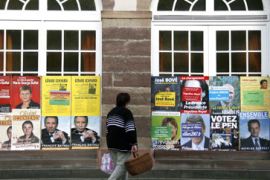
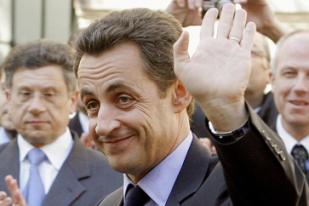 |
| Sarkozy is a formidable career politician [AP] |
Voters will go to the polls on April 22 in elections for France’s next president, with four very different leading candidates aiming to take the post. Al Jazeera looks at each candidate’s background.
Nicolas Sarkozy
Nicolas Sarkozy, winner of the nomination for the centre-right Union for a Popular Movement (UMP), has promised to modernise French politics.
The son of Hungarian and French parents, Sarkozy grew up in Paris and trained as a lawyer.
A former interior minister and leader of the UMP, his views on immigration have divided French opinion. In 2005, he called young people in the Paris housing projects “scum”, a comment that fuelled subsequent riots in the suburbs.
Sarkozy has sought to reduce illegal immigration through measures including deportation and has advocated the advancement of disenfranchised social groups through positive discrimination.
Described as an ambitious workaholic, Sarkozy is the main rival to the Socialist nominee Segolene Royal.
His considerable experience in political office and tough, battling style could ultimately sway floating French voters looking for stability in the country.
Segolene Royal
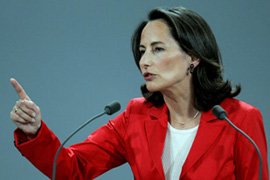 |
| Royal’s campaign has been more subtle than those of her competitors [AP] |
Segolene Royal is the Socialist candidate in the election, and is aiming to become France’s first female president.
Royal, who was born in Senegal, graduated in economics and went on to study at the Ecole Nationale d’Administration (ENA), an influential school where many senior French officials were educated.
She is a former enivironment minister and has also held two junior minister posts, but this pales next to Sarkozy’s two spells as interior minister – one of the toughest and most coveted portfolios. She is currently the regional prime minister of Poitou-Charentes.
Royal’s campaign is softer and more approachable than Sarkozy’s, and focuses on her ability to maintain a successful career while bringing up four children.
But former allies have criticised her style of leadership as arrogant, threatening the effectiveness of her campaign.
Nonetheless, Royal is a committed and charismatic politician, able to energise voters disillusioned with the traditional style of French politics.
Jean-Marie Le Pen
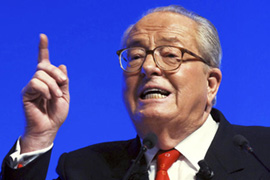 |
| Le Pen has toned down his traditional rhetoric in this year’s contest [AP] |
Jean-Marie Le Pen, leader of the far-right National Front (FN), shocked French politics in 2002 by making it into the final round of voting in presidential elections, defeating Socialist candidate Lionel Jospin along the way.
It was the culmination of Le Pen’s increasing share in the presidential vote – from 0.74 per cent in 1974 to 18 per cent in 2002.
However, while Le Pen’s presidential vote has risen in successive campaigns, the parliamentary performance of the FN has waxed and waned.
A strong showing by the FN in 1986’s parliamentary elections was followed by a failure to win any seats in 2002.
Born in Brittany, the former French legionnaire is a critic of North African immigration.
In 1987, he called the Holocaust “a detail of history”, one of many pronouncements that have divided French people.
In this election campaign, Le Pen appears to be taking a softer line on race and national identity. Critics have accused him of campaigning on a false platform to manipulate the electorate.
Le Pen advocates abandonment of the euro currency, “zero” immigration and deregulation of the French market.
Francois Bayrou
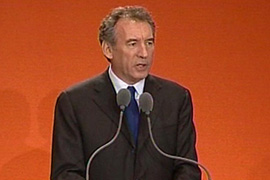 |
| Bayrou promises a new direction for voters tired of traditional French politics [AP] |
The centre candidate in the presidential election, Bayrou could capitalise on the French electorate’s disillusionment with traditional parties on the left and right.
Leader of the centrist Union for French Democracy (UDF), Bayrou is the archetypal “third man” of French politics.
Recent polls have placed him in third, behind Nicolas Sarkozy and Segolene Royal.
Born in south-west France, Bayrou served as education minister between 1993 and 1997.
He has consistently refused to be an ally of the ruling Union for a Popular Movement (UMP) bloc, despite his history being rooted in the centre-right.
Bayrou’s campaign is founded on the creation of a unity government that would bridge left and right politicians.
This tactic appears to a conscious rejection of mainstream politics. His outsider status may appeal to voters, and propel him into the second round of voting.